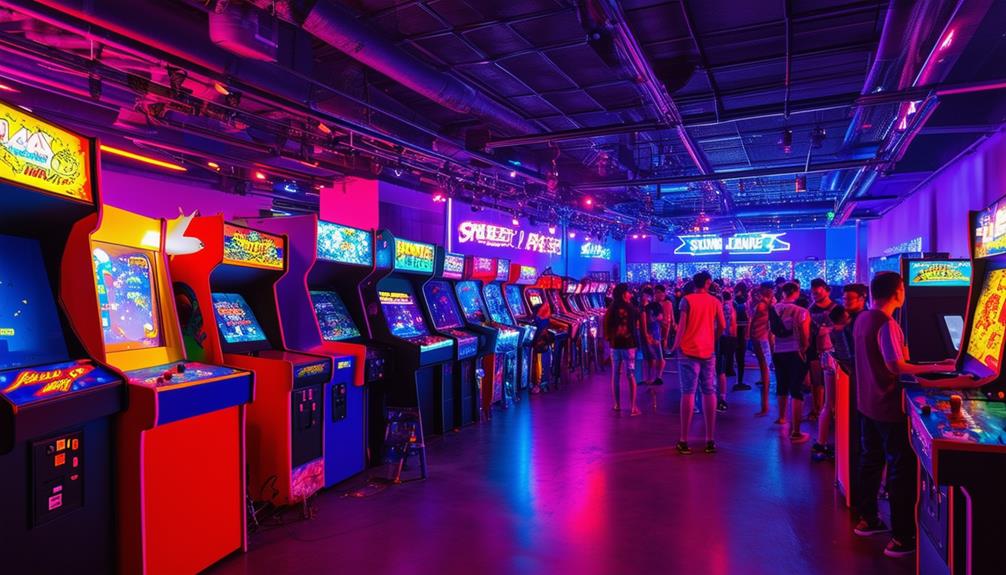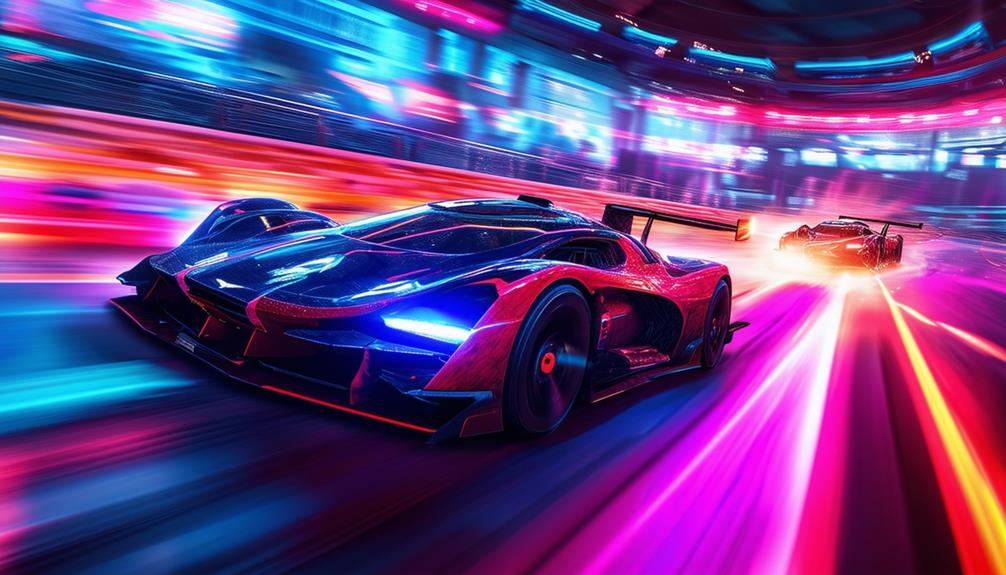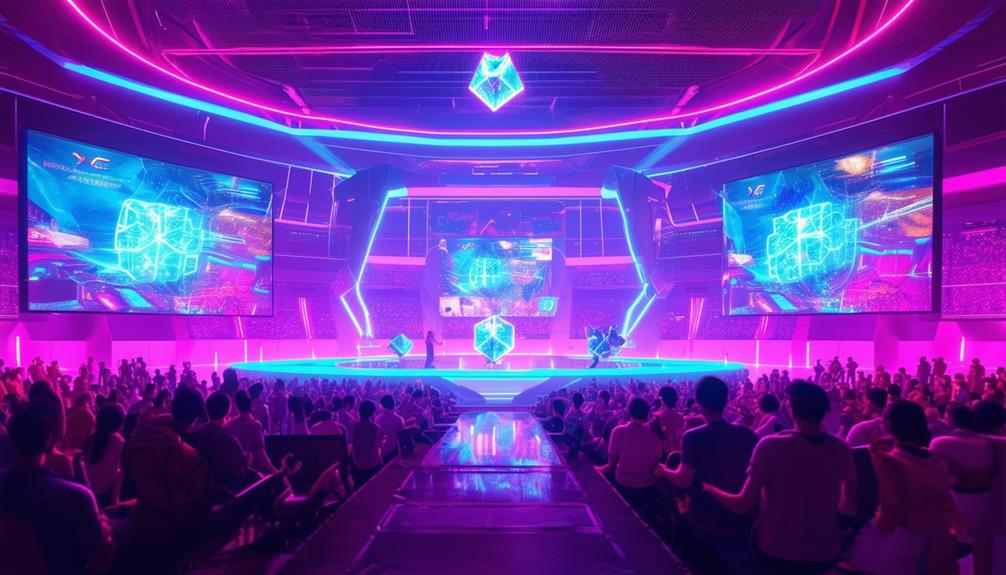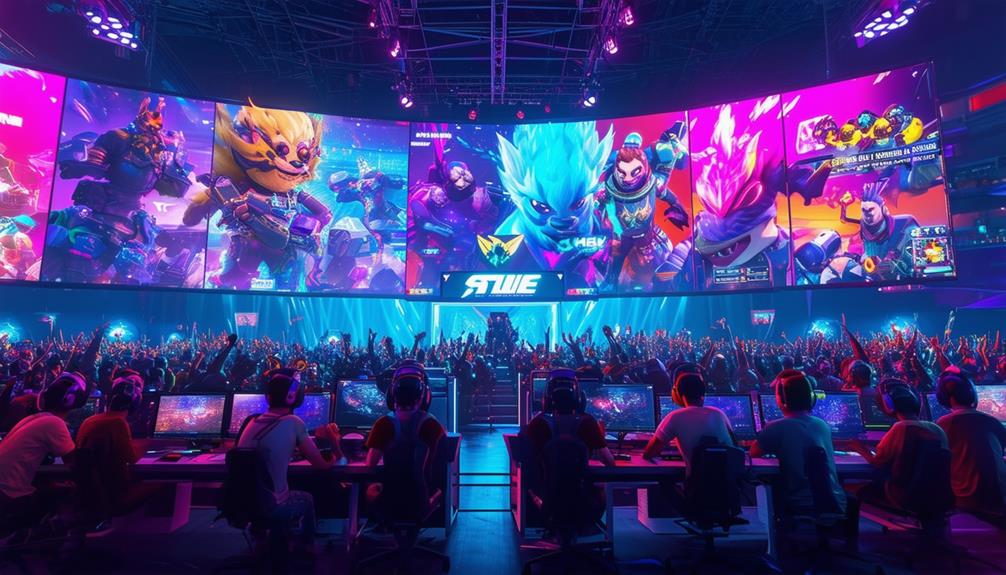How MMORPGS Are Making Their Mark in Esports
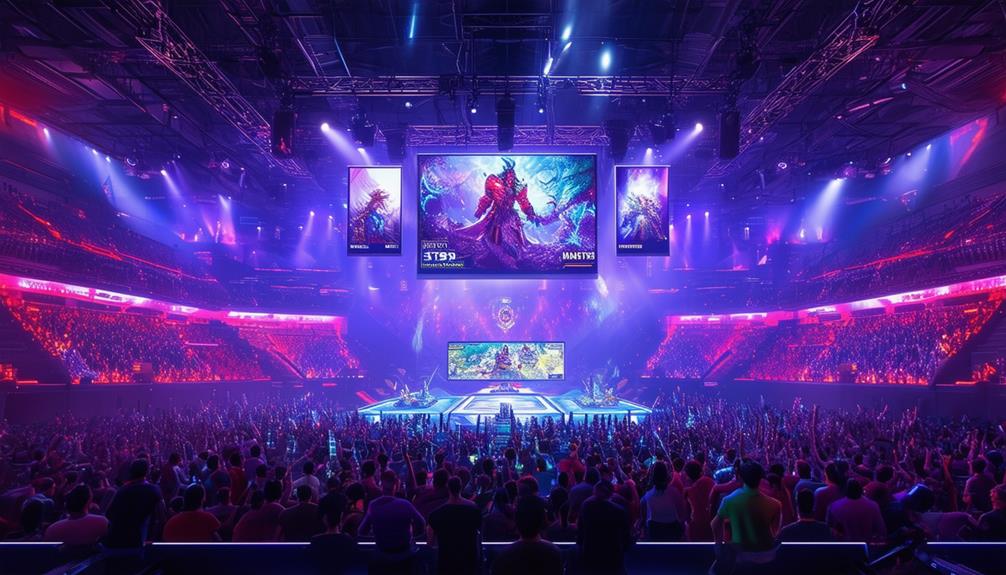
MMORPGs are increasingly making their mark in the esports arena by integrating competitive PvP modes. This shift allows players to display their skills on a global stage, transforming titles like World of Warcraft, Guild Wars 2, and Final Fantasy XIV into hybrid platforms that blend immersive worlds with strategic esports demands.
This evolution raises intriguing questions about the symbiosis of these genres and their potential for mutual growth. How are MMORPGs navigating this transition, and what challenges lie ahead?
Key Takeaways
- MMORPGs are integrating competitive PvP modes to attract the eSports audience.
- Successful MMORPGs balance traditional MMO elements with the requirements of competitive gaming.
- Real-time communication and coordinated team actions are essential for competitive PvP success.
- Community engagement through interactive events and storylines enhances both player and viewer involvement.
- Innovative PvP features like Arena Battles and Battlegrounds offer dynamic and exciting competition.
The Rise of MMORPGS in Esports
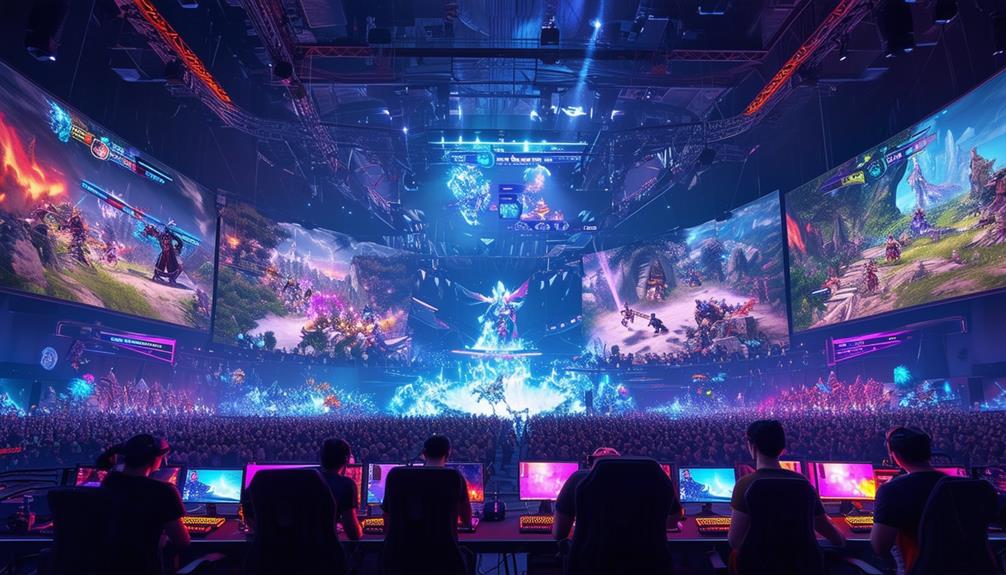
As MMORPGs evolve, they're increasingly integrating competitive PvP modes, transforming the traditional MMO experience into something more dynamic and exhilarating. By incorporating these elements, MMO games are no longer just about questing and leveling up; they now offer a platform to showcase your skills on a global stage.
The competitive experience in these games is meticulously designed to balance traditional MMO elements with the fast-paced action that eSports enthusiasts crave. MMO shooters and strategy games within the MMORPG genre are at the forefront of this transformation. These games offer a unique blend of tactical depth and real-time action, making them ideal for eSports.
The competitive modes are designed to keep players engaged, ensuring that every match is both intense and rewarding. Achieving a balance between traditional MMO elements and the competitive nature of eSports is crucial for success. Developers are keenly aware of the need to maintain the core MMO experience while also catering to the demands of the eSports community.
This balance not only enhances gameplay but also improves the viewer experience, making it more engaging to watch. If you're seeking an MMO game with a competitive edge, the evolving eSports landscape has much to offer.
Key Games Leading the Charge
Leading the charge in the eSports transformation of MMORPGs, titles like World of Warcraft and Guild Wars 2 are setting new benchmarks with their competitive PvP modes. These games are evolving from traditional MMORPGs into eSports powerhouses by incorporating elements that attract both casual gamers and hardcore eSports enthusiasts.
World of Warcraft's Arena tournaments have become a staple in the eSports calendar, drawing significant viewership and participation. Guild Wars 2 also excels with its structured PvP, offering balanced competition and thrilling gameplay.
Meanwhile, MMORPGs like Final Fantasy XIV and Elder Scrolls Online are adapting to eSports trends by integrating features like ranked matches and seasonal tournaments to emphasize competitive play.
Black Desert Online and Blade & Soul are delving into eSports integration as well, focusing on intense PvP battles that highlight player skill and strategy. Even Riot Games, renowned for their success with League of Legends, is exploring the MMO space, hinting at a future where massively multiplayer online games could be a key part of their competitive portfolio. These games are pushing the boundaries of what an MMO can achieve in the eSports arena, blending the depth of traditional MMORPGs with the excitement of competitive gameplay.
Strategic Depth and Teamwork
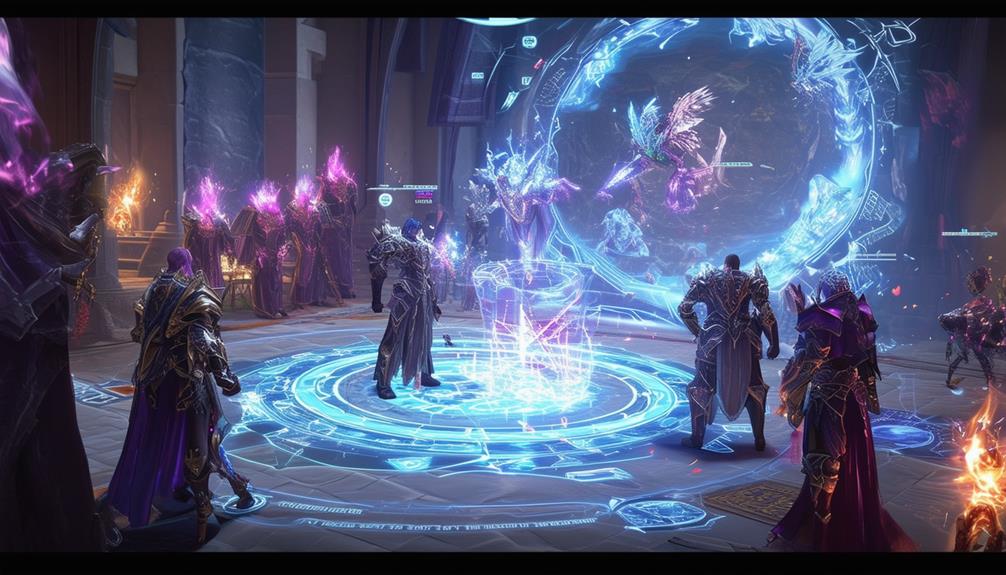
In competitive MMORPGs, the strategic depth and teamwork required elevate gameplay to a level where every decision and coordinated effort can determine victory or defeat. Teams of players must synchronize their actions, leveraging each member's strengths to outmaneuver their opponents. This coordination is crucial in competitive play, where both individual skill and precise teamwork can tip the scales.
The strategic depth in MMORPGs often revolves around class roles, tactics, and communication. Each player's class and abilities contribute uniquely to the team's overall strategy. Effective teams excel in resource management and player synergy, seamlessly combining their efforts to achieve common goals.
Here's a table highlighting key elements of strategic depth and teamwork in MMORPG eSports:
| Element | Description | Impact on Teamplay |
|---|---|---|
| Class Roles | Specialized abilities unique to each class | Defines team strategy |
| Tactics | Planned actions and maneuvers | Guides team decisions |
| Communication | Real-time coordination between players | Enhances teamwork |
| Resource Management | Efficient use of in-game resources | Sustains team effectiveness |
| Player Synergy | Harmonious combination of player actions | Maximizes overall performance |
Competitive PvP Elements
Incorporating competitive PvP elements into MMORPGs adds a dynamic edge that appeals to the eSports audience, enhancing the strategic depth and teamwork essential for these games. Titles like World of Warcraft (WoW) exemplify this trend by introducing modes that cater to both casual players and hardcore competitors, thus balancing traditional MMORPG aspects with the fast-paced, competitive gameplay desired by eSports enthusiasts.
Key competitive PvP features in MMORPGs include:
- Arena Battles: Small team-based matches that emphasize quick, strategic combat.
- Battlegrounds: Larger, objective-based scenarios requiring coordination and tactical execution.
- Open-World PvP: Spontaneous encounters that test players' skill and adaptability.
These elements demand critical thinking and close teamwork, extending beyond mere combat. Additionally, MMO shooters and strategy games within the MMORPG genre are exploring eSports opportunities, adding layers of excitement and complexity.
The challenge for developers lies in balancing these competitive PvP features with the core MMORPG experience. Successfully achieving this balance can attract a dedicated eSports audience, ensuring the game's longevity and sustained appeal in the competitive gaming scene.
Community and Fan Engagement
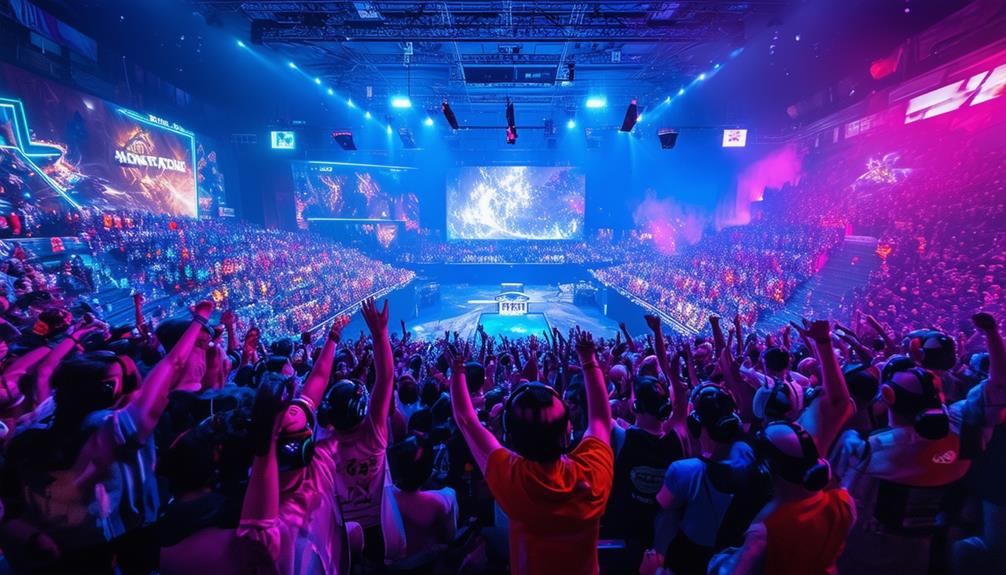
MMORPG eSports flourish by cultivating vibrant communities where fans and players engage deeply with the game and each other. The immersive and social nature of Massively Multiplayer Online Role-Playing Games (MMORPGs) makes them ideal for fostering community participation. Hosting interactive tournaments and collaborative gameplay experiences encourages players to connect and compete meaningfully.
| Key Aspect | Description | Impact on Engagement |
|---|---|---|
| Immersive Gameplay | Deep, story-driven worlds | Strong player investment |
| Social Interaction | Real-time communication and teamwork | Enhanced community bonds |
| Interactive Events | Competitive events with fan involvement | Higher viewer and player turnout |
| Community Narratives | Shared experiences and story progression | Increased sense of belonging |
| Dedicated Players | Passionate, loyal player base | Steady community growth |
MMORPG eSports events attract a dedicated community of players and viewers, enhancing fan interaction. Interactive tournaments allow fans to participate directly or support their favorite teams, creating a dynamic spectator experience. Community-driven narratives also play a crucial role, as shared stories and experiences foster a sense of belonging among players. This blend of competitive and collaborative elements ensures that MMORPG eSports not only entertain but also build lasting relationships within their communities.
Challenges and Opportunities
Breaking into the eSports scene presents unique challenges and opportunities for MMORPGs, despite their immersive worlds and dedicated communities. Unlike traditional eSports games, MMORPGs primarily focus on PvE gameplay, which doesn't easily lend itself to competitive eSports. However, their potential for integration into the eSports domain is promising.
To make MMORPGs eSports-friendly, developers need to balance traditional MMO elements with competitive gameplay. PvP modes in games like World of Warcraft show potential but require fine-tuning to ensure a level playing field. Additionally, MMO subgenres such as MMO shooters and strategy games are already exploring this integration to attract a broader audience.
Key challenges and opportunities include:
- Balancing Act: Combining classic MMO features with eSports demands is crucial for long-term success.
- Viewer Engagement: Community-driven narratives and immersive storytelling can captivate audiences, enhancing the viewer experience.
- PvP Potential: Developing and refining PvP modes can make MMORPGs more appealing to the eSports audience.
The success of MMORPGs in eSports hinges on addressing these challenges while leveraging their inherent strengths. With the right approach, MMORPGs can carve out a niche in the competitive gaming landscape, blending rich narratives with thrilling gameplay.
Success Stories and Milestones
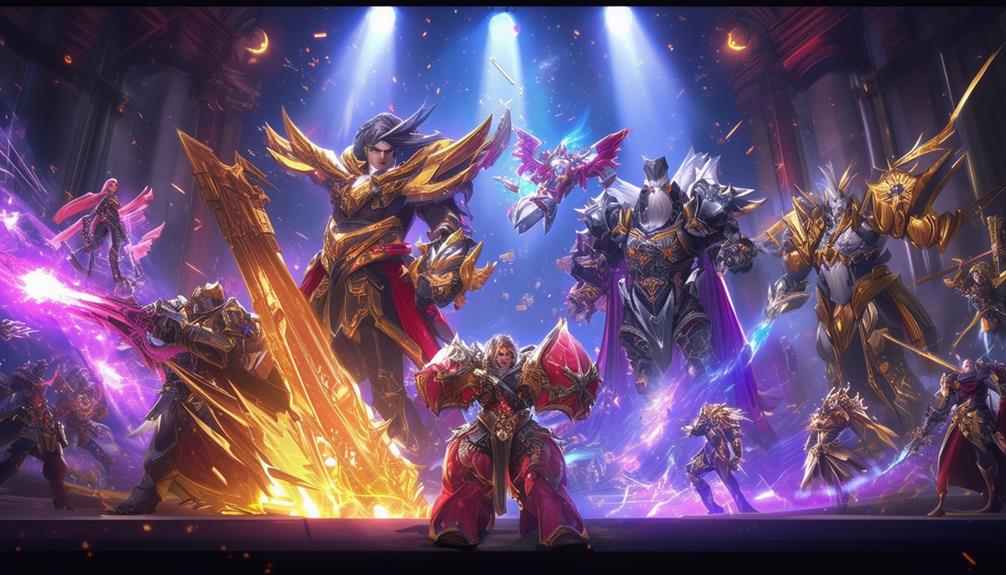
A standout success in integrating MMORPG elements into eSports is Old School RuneScape's Deadman Mode, which captivated audiences with its thrilling last-man-standing competition format. This eSports experiment not only showcased the depth of MMO influences but also introduced a unique twist to competitive gaming. With a $10,000 winner-takes-all prize, the stakes were high, adding a layer of significance and competitiveness to the event.
The success stories from Deadman Mode highlight how balancing MMO elements with competitive gameplay can lead to engaging and dramatic eSports experiences. The blend of freedom and depth typical of MMORPGs with the excitement of competitive play created a riveting viewer experience. Players had to navigate not only their skills but also strategic planning and alliances, making each match a gripping narrative.
Reaching these milestones wasn't without challenges. Issues such as spoilers and technical difficulties needed to be addressed. However, the overall success of Deadman Mode signals the potential of MMORPGs in the eSports arena. This eSports experiment has set a precedent, demonstrating that with the right blend of elements, MMORPGs can carve out a significant niche in competitive gaming.
Future Prospects for MMORPGS in Esports
The future of MMORPGs in eSports will depend on their ability to integrate competitive PvP modes while preserving the rich, immersive experiences these games are known for. To make a significant impact in the eSports arena, MMORPGs must balance their traditional PvE elements with the dynamic, competitive gameplay sought by eSports enthusiasts.
Key factors that could influence the future of MMORPGs in eSports include:
- Enhanced PvP Modes: Games like World of Warcraft have shown potential with PvP arenas. Refining these modes can offer thrilling, skill-based competitions.
- Innovative MMO Subgenres: Titles that blend MMO elements with shooters or strategy games are exploring new eSports opportunities, paving the way for more diverse competitive experiences.
- Balanced Gameplay: Ensuring that both PvE and PvP elements are well-integrated and balanced is crucial. This maintains the game's core appeal and attracts a broader audience.
Frequently Asked Questions
Do MMOS Have Esports?
Yes, MMOs do have esports. Games like World of Warcraft (WoW) feature PvP modes that highlight competitive gameplay. Additionally, MMO shooters and strategy games are increasingly being integrated into the esports scene, blending traditional MMO elements with competitive play.
How Has Esports Changed the Gaming Industry?
Esports has transformed the gaming industry by elevating competitive gaming to a global stage. This shift has led to massive events, substantial prize pools, and professional career opportunities, making gaming a serious pursuit rather than just a hobby.
How Was Esports Created From the Online Game Industry?
Esports emerged from the online gaming industry when games like StarCraft gained widespread popularity. Organized tournaments, particularly in South Korea during the early 2000s, played a crucial role in propelling competitive gaming onto the global stage. This transformation turned casual gaming into professional leagues, attracting massive audiences and offering substantial prize pools.
How Are Esports Growing?
Esports are experiencing rapid growth due to increased global viewership, significant cash prizes, and the rise of professional tournaments. The industry's appeal continues to expand, with more individuals participating and popular game genres such as MOBAs (Multiplayer Online Battle Arenas) and shooters driving the trend.
Conclusion
Massively multiplayer online role-playing games (MMORPGs) are making significant strides in the esports arena, seamlessly combining strategic depth, teamwork, and competitive player-versus-player (PvP) elements. Titles like World of Warcraft, Guild Wars 2, and Final Fantasy XIV are at the forefront, attracting diverse audiences and building robust communities.
While there are challenges to overcome, the opportunities are extensive. As MMORPGs achieve new milestones, they'll continue to carve out their unique space in competitive gaming, heralding a promising future. Prepare yourself for the journey—it's only just beginning!

